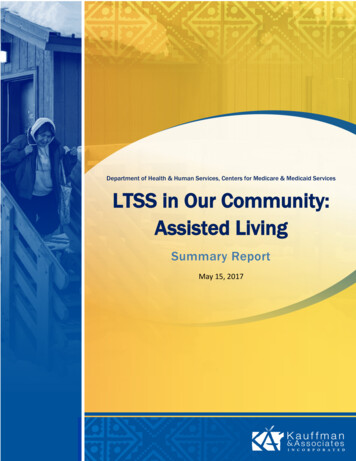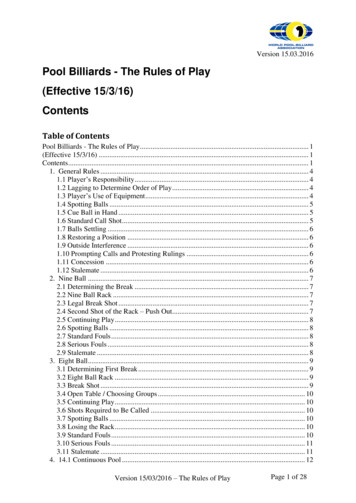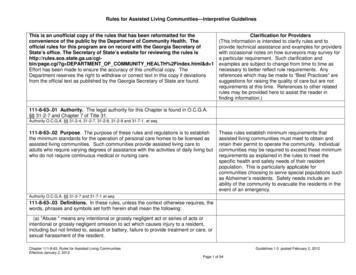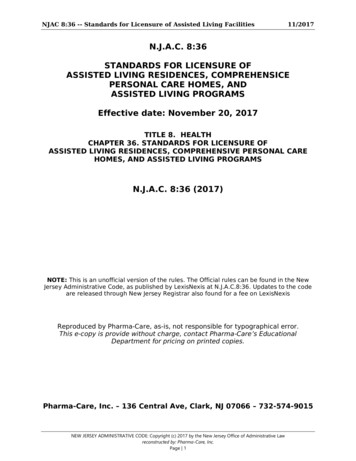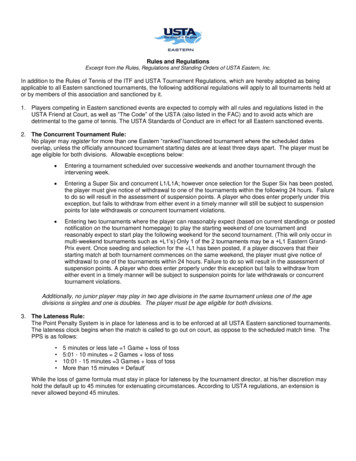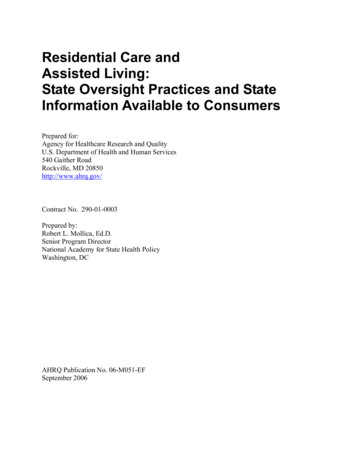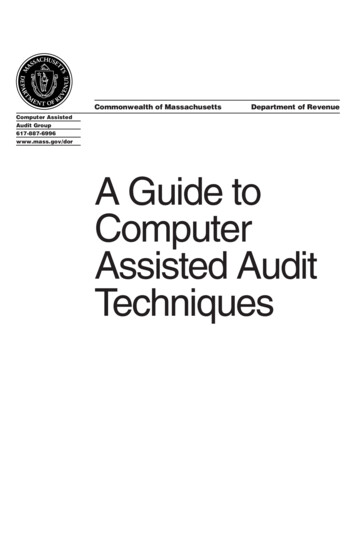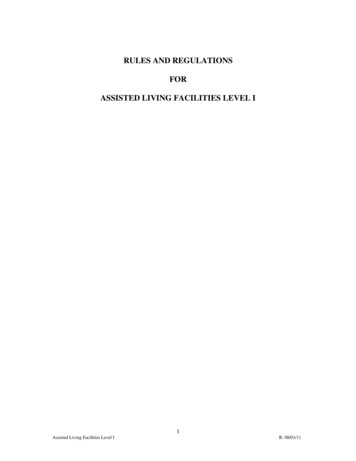
Transcription
RULES AND REGULATIONSFORASSISTED LIVING FACILITIES LEVEL I1Assisted Living Facilities Level IR. 08/01/11
100SCOPE . 4200PURPOSE . 4300DEFINITIONS . 4400LICENSURE . 11401402403404405406LICENSING INFORMATION . 12INITIAL LICENSURE . 13COMPLIANCE . 13APPLICATION, EXPIRATION AND RENEWAL OF LICENSE . 13CHANGE IN OWNERSHIP . 16PROVISIONAL LICENSURE . 17500ADMINISTRATION . 18501GOVERNING BODY . 18502GENERAL PROGRAM REQUIREMENTS . 18503CONTRACTUAL AGREEMENTS. 19504PERSONNEL AND GENERAL POLICIES AND PROCEDURES . 19505GENERAL REQUIREMENTS CONCERNING RESIDENTS. 26506QUALITY ASSURANCE. 30507REPORTING SUSPECTED ABUSE, NEGLECT, OR MISAPPROPRIATION OF RESIDENTPROPERTY. 31508RESIDENT RECORDS . 34600ADMISSION, DISCHARGE AND TRANSFER . 36601602603ADMISSIONS . 36INVOLUNTARY TRANSFER OR DISCHARGE OF RESIDENT . 41BILL OF RIGHTS . 44700SERVICES . 48701702703704DIRECT CARE SERVICES . 54HEALTH CARE SERVICES . 55DEVELOPMENT AND IMPLEMENTATION OF SERVICE PLAN . 61COMPLIANCE AGREEMENTS . 63800DEFINITIONS . 65801802803804805806807GENERAL ADMINISTRATION . 68ASSESSMENTS . 70STANDARDS FOR ALZHEIMER’S SPECIAL CARE UNITS . 72EGRESS CONTROL . 74STAFFING. 74ADMISSIONS, DISCHARGES, TRANSFERS . 78THERAPEUTIC ACTIVITIES . 80900PHYSICAL ENVIRONMENT . 80901902903904905906NEW CONSTRUCTION, REMODELING OR ADDITIONS . 81CONVERTED FACILITIES. 86FURNISHINGS AND EQUIPMENT . 87REQUIREMENTS FOR RESIDENT GENERAL USE/COMMON AREAS. 89APARTMENTS . 92SAFETY STANDARDS . 942Assisted Living Facilities Level IR. 08/01/11
907908909910911912913WATER SUPPLY . 95SEWAGE . 95PLUMBING . 95ELECTRICAL . 95HEATING/COOLING . 95ZONING CODES. 96LOT REQUIREMENTS . 961000IMPOSITION OF REMEDIES - AUTHORITY . 961001INSPECTIONS BY DEPARTMENT . 971002GENERAL PROVISIONS . 981003REMEDIES . 991004TEMPORARY ADMINISTRATION . 1001005STATE MONITORING . 1011006DIRECTED PLAN OF CORRECTION . 1021007DIRECTED IN-SERVICE TRAINING . 1021008TRANSFER OF RESIDENTS OR CLOSURE OF THE FACILITY AND TRANSFER OFRESIDENTS . 1031009TERMINATION OF LEVEL I ASSISTED LIVING FACILITY LICENSE . 1041010DENIAL OR SUSPENSION OF NEW ADMISSIONS . 1041011CIVIL MONEY PENALTIES . 1051012CLOSURE . 1051100INFORMAL DISPUTE RESOLUTION (IDR) . 105110110021003REQUESTING AN INFORMAL DISPUTE RESOLUTION (IDR) . 106MATTERS WHICH MAY BE HEARD AT IDR . 106APPEALS TO COURT . 106APPENDIX . 107FORMS 107DMS-731 . 108DMS-742 . 112AUTHORIZATION FOR ADULT MALTREATMENT CENTRAL REGISTRY . 5NOTARIZATION REQUIRED . 53Assisted Living Facilities Level IR. 08/01/11
100SCOPEThese rules and regulations constitute the basis for the licensure of Level Iassisted living facilities by the Arkansas Department of Human Services, Divisionof Medical Services, Office of Long Term Care. The Office of Long Term Carereserves the right, and may at any time, waive any or all of the requirementsherein in event of emergency or for good cause shown in the sole determination ofthe Office of Long Term Care.200PURPOSEThe purpose of these rules and regulations is to establish standards for Level Iassisted living facilities that provide services in a homelike environment forelderly and disabled persons. Level I assisted living facilities ensure thatresidents receive supportive health and social services as they are needed toenable them to maintain their individuality, privacy, dignity, and independence, inthe highest degree possible in an apartment-style living unit. The assisted livingenvironment actively encourages and supports these values through effectivemethods of service delivery and facility or program operation. The environmentpromotes resident self-direction and personal decision-making while protectingresident’s health and safety.300DEFINITIONSAs used in these rules and regulations, the following definitions shall apply unlessthe context clearly states otherwise. Where these rules and regulations refer to anenactment of the General Assembly, such reference shall include subsequentenactment or amendments by the General Assembly on the same subject matter.Abuse – Shall have the same meaning as prescribed by Ark. Code Ann. § 5-28101 and 42 CFR §488.301. “Abuse” also includes sexual abuse as defined in Ark.Code Ann. § 5-28-101 (12).Activities of Daily Living – The activities of daily living that are performed eitherindependently, with supervision, with assistance, or by others. Activities of dailyliving include, but are not limited to, ambulating, transferring, grooming, bathing,dressing, eating and toileting.ADA – The Americans with Disabilities Act.Administrator – The person who has successfully completed a course of trainingor instruction certified by the Office of Long Term Care as an assisted livingfacility administrator who is in charge of the daily operation of the facility. Untilprograms have been certified by the Office of Long Term Care, Residential CareFacility Administrators or Nursing Home Administrators may be used.4Assisted Living Facilities Level IR. 08/01/11
Advertise – To make publicly and generally known.definition, advertise includes, but is not limited to:For purposes of this1.Signs, billboards, or lettering;2.Electronic publishing or broadcasting, including the use of the Internet ore-mail; and3.Printed material.Alzheimer’s Special Care Unit (ASCU) – A separate and distinct unit within anAssisted Living or other Long Term Care facility that segregates and provides aspecial program for residents with a diagnosis of probable Alzheimer’s disease orrelated dementia, and that advertises, markets or otherwise promotes the facilityas providing specialized Alzheimer’s or related dementia care services.Assisted Living Facility (ALF) – Any building or buildings, section or distinctpart of a building, boarding home, home for the aged or other residentialfacility whether operated for profit or not that undertakes through itsownership or management to provide assisted living services for a periodexceeding twenty-four (24) hours to more than three (3) adult residents ofthe facility who are not relatives of the owner or administrator. Assistedliving facility means facilities in which assisted living services areprovided either directly or through contractual arrangements or in whichcontracting in the name of residents is facilitated.Assisted Living Program – A program of assisted living services.Assisted Living Services – Housing, meals, laundry, social activities, assistancewith transportation, direct care services, health care services, 24-hour supervisionand care, and limited nursing services. For purposes of these regulations,assistance with transportation means making arrangements for transportation.Caregiver – Shall have the same meaning prescribed by Ark. Code Ann. § 5-28101.Choice – Viable options available to a resident that enables the resident toexercise greater control over his or her life. Choice is supported by resident’sself-directed care (including methods and scheduling) established through the careplanning process, and the provision of sufficient private and common spacewithin the facility to provide opportunities for residents to select when and how tospend time, and when and how to receive personal or assisted living services.Common Areas (for Alzheimer’s Special Care Units) – Portions of theAlzheimer’s Special Care Unit, exclusive of residents’ rooms and bathrooms.Common areas include any facility grounds accessible to residents of the5Assisted Living Facilities Level IR. 08/01/11
Alzheimer’s Special Care Unit.Compliance Agreement – If needed, the written formal plan developed inconsideration of shared responsibility, choice and assisted living values andnegotiated between the resident or his or her responsible party and the assistedliving facility to avoid or reduce the risk of adverse outcomes that may occur inan assisted living environment.Continuous – Available at all times without cessation, break or interruption.Deficiency – A facility’s failure to meet program participation requirements asdefined in these and other applicable regulations and laws.Dementia – A loss or decrease in intellectual ability that is of sufficient severity tointerfere with social or occupational functioning; it describes a set of symptomssuch as memory loss, personality change, poor reasoning or judgment, andlanguage difficulties.Department – The Department of Human Services and its divisions and offices.Direct Care Services – Services that directly help a resident with certain activitiesof daily living such as assistance with mobility and transfers; assistance toresident to consume a meal, grooming, shaving, trimming or shaping fingernailsand toenails, bathing, dressing, personal hygiene, bladder and bowelrequirements, including incontinence, or assistance with medication, only to theextent permitted by the state Nurse Practice Act and interpretations thereto by theArkansas State Board of Nursing.Direct Care Service Plan – A written plan for direct care services that isdeveloped to meet the needs and preferences of the resident or his or herresponsible party through a negotiated process that becomes a part of theresident’s occupancy admission agreement.Direct Care Staff – Any licensed or certified staff acting on behalf of, employedby, or contracted by the facility, to provide services and who provides direct careservices or assistance to residents, including activities of daily living and tasksrelated to medication administration or assistance.Direct Care Staff (Alzheimer’s Special Care Unit) – An individual who is anemployee of the facility, or an individual who is an employee of a temporary oremployment agency assigned to work in the facility, who has received or willreceive, in accordance with these regulations, specialized training regardingAlzheimer’s or related dementia, and who is responsible for providing direct,hands-on care or cuing services to residents of the ASCU.Direct Contact – The ability or opportunity of employees of the facility, or6Assisted Living Facilities Level IR. 08/01/11
individuals with whom the facility contracts, to physically interact with or be inthe presence of residents.Direct Threat – A significant risk to the health or safety of self or others thatcannot be eliminated by reasonable accommodation. This term as used in theserules and regulations is designed to ensure conformity with the Americans withDisabilities Act (ADA) in determining whether a person with a disability poses a“direct (health or safety) threat”.Directed Plan of Correction – A plan developed by the Office of Long Term Carethat describes the actions the facility will take to correct deficiencies and specifiesthe date by which those deficiencies will be corrected.Discharge – When a resident leaves the facility, and it is not anticipated that theresident will return. A discharge occurs when a return to the facility by theresident requires that admission procedures set forth in these regulations befollowed.Disclosure Statement (Alzheimer’s Special Care Unit) – A written statementprepared by the facility and provided to individuals or their responsible parties,and to individual’s families, prior to admission to the ASCU, disclosing the formof care, treatment, and related services especially applicable to, or suitable forresidents of, the ASCU.Elopement – Circumstances where a resident, who has been identified as beingcognitively impaired, has left a facility without staff knowledge. Facilities mustcomply with all reporting requirements of any special programs in which theyparticipate.Emergency Measures – Those measures necessary to respond to a serioussituation that threatens the health and safety of residents.Endangered Adult – Shall have the same meaning as prescribed by Ark. CodeAnn. § 5-28-101 and as amended.Exploitation – Shall have the same meaning as prescribed by Ark. Code Ann. § 528-101.First Aid Measures – Temporary interventions necessary to treat trauma or injury.Health Care Service Plan – A written plan for health care services that isdeveloped to meet the needs and preferences of the resident or his or herresponsible party through a negotiated process that becomes a part of theresident’s occupancy admission agreement.Health Care Services – The provision of services in an assisted living facility that7Assisted Living Facilities Level IR. 08/01/11
assists the resident in achieving and maintaining well-being (e.g., psychological,social, physical, and spiritual) and functional status. This may include nursingassessments and the monitoring and delegation of nursing tasks by registerednurses pursuant to the Nurse Practice Act and interpretations thereto by theArkansas State Board of Nursing, care management, records management andcoordinating basic health care and social services in such settings. Health careservices may not be provided in a Level I Assisted Living Facility except asprovided in Section 702 of these regulations.Home Health Services – Home health aide services, medical supplies suitable foruse in the resident’s assisted living facility apartment, and nursing services asdefined in the state Nurse Practice Act and interpretations thereto by the ArkansasState Board of Nursing.IDR – The informal dispute resolution process as described in these regulations.Imminent Danger to Health and Safety – Shall have the same meaning asprescribed by Ark. Code Ann. § 5-28-101.Impaired Adult – Shall have the same meaning as prescribed by Ark. Code Ann. §5-28-101.Independence – The maintenance and promotions of resident capabilities toenhance the resident’s preferences and choices within a barrier-free environment.Individual Assessment Team (IAT) – A group of individuals possessing theknowledge and skills to identify the medical, behavioral, and social needs ofresidents of the Alzheimer’s Special Care Unit (ASCU), and to develop servicesdesigned to meet those needs.Individual Support Plan – A written plan developed by an Individual AssessmentTeam (IAT) that identifies services to a resident of the Alzheimer’s Special CareUnit (ASCU).Limited Nursing Services – Acts that may be performed by licensed personnelwhile carrying out their professional duties, but limited to those acts that thedepartment specifies by rule. Acts that may be specified by rule as allowablelimited nursing services shall be for persons who meet the admission criteriaestablished by the Department for facilities offering assisted living services, shallnot be complex enough to require twenty-four (24) hour nursing supervision andmay include such services as application and care of routine dressings, and care ofcasts, braces, and splints.Long Term Care Facility License – A time-limited, non-transferable, permitrequired by Ark. Code Ann. § 20-10-224 and issued for a maximum period oftwelve (12) months to a licensee who complies with Office of Long Term Care8Assisted Living Facilities Level IR. 08/01/11
rules and regulations. This document must list the maximum number of beds forthe facility.Medication Assistance and Monitoring – Services provided by the facility, eitherdirectly or through contract, in accordance with the Nurse Practices Act andinterpretations thereto by the Arkansas State Board of Nursing, designed to ensurethat residents receive necessary or prescribed medication, and to prevent wastageof medication.Mental Abuse – Verbal, written, or gestured communication, to a resident, or to avisitor or staff, about a resident within the resident’s presence, or in a publicforum, that a reasonable person finds to be a material endangerment to the mentalhealth of a resident.Neglect – Shall have the same meaning as prescribed by Ark. Code Ann. § 5-28101 and 42 C.F.R. §488.301.New Admission – An individual who is being admitted to the facility for the firsttime, or who is returning after a formal discharge.Non-Compliance – Any violation of these regulations, or of applicable law orregulations.Nurse Practice Act – As used in these regulations, the term Nurse Practice Actrefers to Ark. Code Ann. §17-87-101 et seq. and interpretations thereto by theArkansas State Board of Nursing.Operator – The individual or entity that conducts the business of the facility. Theindividual or individuals executing the licensure application form shall be deemedan operator.OLTC – The Office of Long Term Care.Office of Long Term Care – The Office in the Division of Medical Services of theDepartment of Human Services that has responsibility for the licensure,certification, and regulation, of long term care facilities, herein referred to as theOffice or OLTC.Person – An individual, partnership, association, corporation, or other entity.Personnel/Staff/Employee – Any person who, under the direction, control, orsupervision of facility administration, provides services as defined in theseregulations for compensation, or who provides services voluntarily, and mayinclude the owner, operator, professional, management and persons, firms, orentities providing services pursuant to a contract or agreement.9Assisted Living Facilities Level IR. 08/01/11
Plan of Correction (P-o-C) – A plan developed by the facility and approved byOLTC that describes the actions the facility will take to correct deficiencies, andwhich specifies the date by which those deficiencies will be corrected.PRN – A medication or treatment prescribed by a medical professional to aperson, allowing the medication or ointment to be given “as needed”.Program Requirements – The requirements for participation and licensure underthese and other applicable regulations and laws as an assisted living facility.Proprietor/Licensee – Any person, firm, corporation, governmental agency orother legal entity, issued an assisted living facility license, and who is responsiblefor maintaining approved standards.Protective Services – Shall have the same meaning as prescribed by Ark. CodeAnn. § 5-28-101.Provisional Licensure is a temporary grant of authority to the purchaser to operatean existing long-term care facility upon application for licensure to the Office ofLong Term Care.Provisional Placement – Placement in an assisted living facility made for thepurposes of assessment to determine appropriateness of admission or emergency,such as placement by law enforcement or Adult Protective Services. Aprovisional placement shall be permitted for no longer than thirty (30) days, atwhich time the resident must either be discharged or admitted to the facility inconformity with theses regulations. A provisional placement shall not be anadmission pursuant to these regulations, and any individual in an assisted livingfacility pursuant to a provisional placement shall not be deemed a resident of thefacility.Responsible Party – An individual, who, at the request of the applicant orresident, or by appointment by a court of competent jurisdiction, agrees to act onbehalf of a resident or applicant for the purposes of making decisions regardingthe needs and welfare of the resident or applicant. These regulations, and thisdefinition, does not grant or permit, and should not be construed as granting orpermitting, any individual authority or permission to act for or on behalf of aresident or applicant in excess of any authority or permission granted by law. Acompetent resident may select a responsible party or may choose not to select aresponsible party. In no event may an individual act for, or on behalf of, aresident or applicant when the resident or applicant has a legal guardian, attorneyin-fact, or other legal representative. For purposes of these regulations only,responsible party will also refer to the terms legal representative, legal guardian,power of attorney or similar phrase.Separate Premises – Buildings housing Assisted Living Facility operations that10Assisted Living Facilities Level IR. 08/01/11
are located on non-contiguous land.Significant Change – Any improvement or decline in a resident’s medical,physiological, psychological, or social condition, in which:a.The decline cannot be reasonably expected to resolve itself; or,b.In which the decline may cause a worsening of another or pre-existingmedical, physiological, psychological, or social condition.Substandard Quality of Care – One or more deficiencies related to participationrequirements, as set forth in these or other applicable regulations or laws, thatconstitute either immediate jeopardy to resident health or safety; a pattern of, orwidespread actual harm, that is not immediate jeopardy; or a widespread potentialfor more than minimal harm, but less than immediate jeopardy, with no actualharm.Survey – The process of inspection, interviews, or record reviews, conducted bythe Office of Long Term Care.Standard Survey - A comprehensive survey conducted by the Office of LongTerm Care on an average of every 18 months for each facility.Transfer – The temporary or permanent relocation of a resident from one livingunit within the facility to another living unit within the facility, or the temporaryrelocation of a resident to a location outside the facility.Twenty-Four (24) Hour Nursing – Services that are ordered by a physician oradvance practice nurse for a resident whose condition requires the supervision ofa physician or advance practice nurse and continued monitoring of vital signs andphysical status and whose condition is medically complex enough to require onsite nursing supervision on a twenty-four (24) hour per day basis.Visually and Functionally Distinct Area – A space that can be distinguished fromother areas within the apartment by sight. A visually and functionally distinctarea need not be a separate room. To create a visually distinct area, one or moreof the following methods must be employed: change in ceiling height, separationby c
Assisted Living Program – A program of assisted living services. Assisted Living Services – Housing, meals, laundry, social activities, assistance with transportation, direct care services, health care services, 24-hour supervision and care, and limited nursing serv



